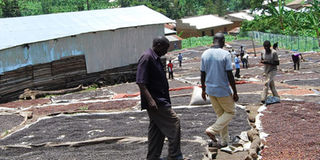95 coffee factories face closure over standards

Advised. Farmers dry coffee beans at a factory in Bushenyi District in October last year. Coffee factories that do not meet the required standards will be closed. FILE PHOTO
What you need to know:
- In 2016, all coffee factories in Kayunga District were shut down for a week for processing immature coffee. In 2013, 50 factories in Luweero, Mubende, Kiboga, Mpigi, Mityana and Gomba districts were affected.
Kayunga. As the coffee harvesting season draws nearer, owners of coffee processing factories in Kayunga District are panicking after Uganda Coffee Development Authority (UCDA) announced the closure of at least 95 coffee processing factories that do not meet the required standards.
According to Mr Victor Yawe, the UCDA quality officer, all factories built using iron sheets or timber will be closed since they expose coffee beans to rain.
Mr Yawe said coffee factories built in wetlands would also be affected.
“All coffee processing factories constructed in wetlands pose a risk of contamination,” he said in an interview on Tuesday.
He added: “A coffee factory should not be located near a maize or ginger mill because it emits a stench that can be absorbed by the coffee beans.”
Mr Yawe also advised that coffee factories should be constructed out of bricks and equipment that blocks dust from contaminating the environment.
The UCDA official has asked proprietors of the factories that will be affected to immediately relocate before the coffee harvesting season begins.
The coffee harvesting season in Kayunga and other central region areas starts in October and ends in January.
Recently, UCDA officials expressed fear that the country’s coffee risks being banned on the international market if the quality regulations are not strictly implemented.
“The price of our coffee on the international market is low because our produce is contaminated with things like chicken droppings, stones and others,” he said.
He said the measures are aimed at improving the quality of the produce.
According to Mr Yawe, a recent inspection of factories in the district revealed that majority of factories were processing immature coffee, which compromises the quality.
He said some factories were mixing green coffee beans with red cherries while others were drying the coffee beans on bare ground.
Other factories had mouldy coffee beans in the stores, and lacked standard husk collection chambers thus allowing dust to spill over, polluting the processed cherries.
Regulation
According to Coffee Regulations (1994), coffee farmers and dealers are supposed to harvest only red ripe cherries, drying them on raised chambers or tarpaulins and factories must have cemented floors. Kayunga District is one of the major coffee growing areas in the country, however, many coffee factories do not meet the required standards.
In an earlier meeting with UCDA officials, Mr James Wangolo, the chairperson of Uganda Quality Coffee Traders and Processors Association, asked the authority to give them more time so that they can put in place the requirements, arguing that one month notice is too short.
Mr Yawe, however, said the UCDA directive starts with this coffee harvesting season.


